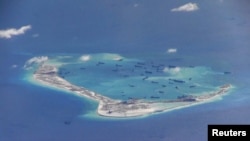Democratic candidates focused heavily on the roles of the U.S. and Russian militaries in Syria as they discussed foreign policy during their first debate Tuesday night, while one presidential hopeful singled out China as the "greatest strategic threat" to the United States.
Former Secretary of State Hillary Clinton advocated a coalition no-fly zone for Syria as a method of helping push Syrian ally Russia to engage with others in the region and work toward a political solution. She said the U.S. needs to stand up to what she called "bullying" by Russian President Vladimir Putin.
"I think it's important too that the United States make it very clear to Putin that it's not acceptable for him to be in Syria creating more chaos, bombing people on behalf of Assad, and we can't do that if we don't take more of a leadership position, which is what I'm advocating," Clinton said.
Vermont Senator Bernie Sanders said he thinks Putin is going to regret Russia's recent actions and is already doing so when it comes to Crimea and Ukraine.
"I think what he is trying to do now is save some face," Sanders said. "But I think when Russians get killed in Syria, and when he gets bogged down, I think the Russian people are going to give him a message that maybe they should come home, maybe they should start working with the United States to rectify the situation now."
Sanders also called the prospect of a no-fly zone in Syria a "very dangerous situation" that could lead to problems, and said the U.S. should not consider sending ground troops there, something Clinton and President Barack Obama have also opposed.
"We should be putting together a coalition of Arab countries who should be leading the effort," he said.
Former Maryland Governor Martin O'Malley, who polls far behind the front-running Clinton and second place Sanders, also said imposing a no-fly zone right now would be a mistake that with Russian planes in the area could lead to an accident and escalation.
Changing outlook on troops overseas
President Obama took office in 2009 with a pledge to end the ongoing wars in Iraq and Afghanistan. With U.S. troops still in both countries in advisory roles and fighting continues, most of the candidates expressed reservations about sending American troops abroad.
Former Rhode Island Senator Lincoln Chafee called "the chaos in the Middle East" the biggest national security threat and said it began with the U.S. invasion of Iraq.
"We've got to stop these wars," he said. "You have to have a new dynamic, a new paradigm."
Sanders called the Iraq war the country's worst foreign policy blunder, while O'Malley said it was one of the worst. Sanders said he does not support the U.S. taking unilateral action and would rely on coalition efforts when the country or its allies are threatened. O'Malley said military action should be "the last option" for a president.
China threat
Former Virginia Senator Jim Webb pivoted his focus to China, saying the greatest strategic threat facing the U.S. is resolving its relationship with China.
"We need to do this because of their aggression in the region," Webb said. "We need to do it because of the way they treat their own people.
He vowed his administration would "do something" about the alleged hacking of U.S. companies and individuals as well as the long-running dispute in the South China Sea where China, the Philippines, Vietnam, Malaysia, Brunei and Taiwan have competing claims.
"You do not own the South China Sea," Webb said. "You do not have the right to conduct cyber warfare against tens of millions of American citizens."
Climate change
Webb also questioned the effectiveness of an agreement the U.S. and China announced a year ago to reduce greenhouse gas emissions in response to climate change, and said the problem needs a global solution.
"The so-called agreements that we have with China are illusory in terms of the immediate requirements of the Chinese government itself," he said. "So let's solve this problem in an international way, and then we really will have a way to address climate change."
Clinton disagreed with his assessment of the deal, but said there can be no effective effort to fight climate change unless China and India are involved.
"I do think the bilateral agreement that President Obama made with the Chinese was significant," she said. "Now, it needs to go farther, and there will be an international meeting at the end of this year, and we must get verifiable commitments to fight climate change from every country gathered there."
Sanders also stressed the need for those countries to take steps, along with Russia, calling climate change a "moral issue" and saying the future of the Earth is at stake.






